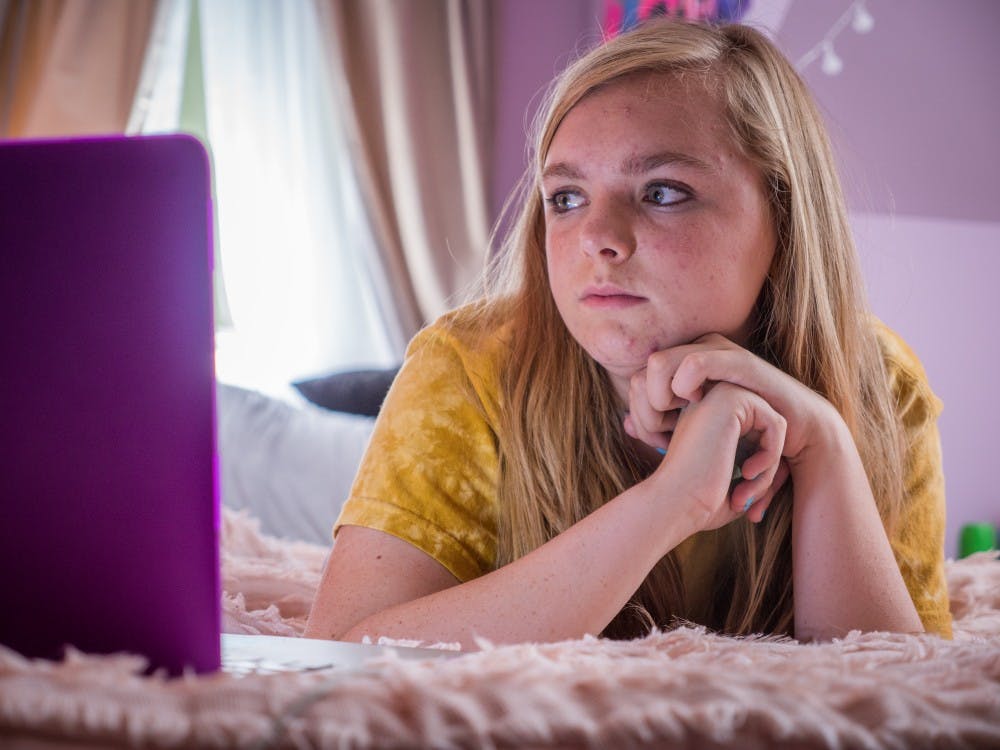Though most famous for his stand–up comedy, Bo Burnham has become a hot topic of late for his new movie, Eighth Grade. Plainly stated, the plot and characters are (un)remarkably normal, at least by today's standards. Starring 15–year–old Elsie Fisher as Kayla, Eighth Grade is a comically awkward and poignantly moving glimpse into the new teenager’s final moments of middle school.
The first shot of the film is a play of one of Kayla’s self–made videos explaining how to “be yourself,” among other mantras of self–confidence. As Eighth Grade cuts to reality, it becomes immediately obvious that she needs to take her own advice. With hunched shoulders and long blonde hair draped around her face, Kayla hides from the intimidating scene of a hallway flooded with boisterous classmates—the quintessential alone–in–a–crowd imagery.
We follow her through a series of average middle school encounters with mean girls, crushes, and the high schoolers on shadowing day. But what might otherwise be unoriginal depictions are reimagined by Burnham for the modern world. The themes of these unforgiving years that are common to the collective consciousness of America are now overrun with the onset of smartphones, laptops, and yes, even dabbing.
Kayla is by no means immune to these vices. Proclaiming herself as talkative in her online videos, yet getting “most quiet” as her eighth grade superlative, we see her living in an unhealthy world of voyeurism through her addictions to Snapchat and Instagram. In fact, there are few scenes in this movie where Kayla isn’t somehow chained to her phone, even distantly. We watch from afar as she ends every night with the screen’s glow lighting up across her face in an imagery that rings true with a spooky familiarity.
The foil to Kayla’s phone obsession is her nervous father, played by Josh Hamilton, who is a single parent overflowing with love and encouragement for his daughter. Telling her to put herself out there and compulsively asking her if everything’s okay as every anxious parent does, he hovers over her journey from loneliness at a popular girl’s pool party to a night at the mall with some newly made high school friends.
But every time things have a chance to start turning up for Kayla, something always goes wrong, pushing her to retreat further and further into herself. The climax of the film occurs when Kayla’s high school buddy from shadow day invites her to come hang out at the mall with her friends that night. A real, kind, non–Instagram–initiated friendship at last!
But the rug is pulled out from under her when at the end of the night, one of the high school boys stops the car while giving her a ride home and dares her to take her shirt off for him. If that’s not vomit–inducing enough, her fear of losing the one friendship she’s found results in her sobbing apologies to the boy for not feeling comfortable enough to follow through on his disgusting request.
The #MeToo qualities of that sequence are further amplified when the camera watches her quake with tears in the corner of her room, her frantic father trying his best to calm her down without fully understanding the weight of what just happened. Later on, in what is undoubtedly the most moving scene of the film, Kayla asks her father to help her burn a time capsule box she made for her present–day self when she was in sixth grade. On the lid is spelled out, “To the coolest girl in the world,” and on a flash drive inside is a video of her asking herself about all of the awesome middle school experiences she’s had and what her boyfriend is like, to which eighth grade Kayla has no answer.
As the flames lick up the sides of the shoebox, Kayla asks her father, “Do I ever make you sad?” In a touching monologue, he tells her how much he wishes she could see herself the way he does: as someone who never needed to be taught how to be kind or to share, because they were qualities that came naturally to her. Her virtual image–centric worlds of social media are foreign to him, making his evaluation of her character all the more gripping to members of the audience who realize that similarly intrinsic qualities are being buried behind appearances.

Despite these deeply provoking scenes, Eighth Grade is not a depressing condemnation of today’s youth. The dark side of social media overuse is balanced by pop culture references like the hilarious student echoes of the “Lebron James” vine as the teachers try to quiet the room for an assembly. And though there is minimal plot advancement overall, the denouement is still a net positive one, even if only slightly, as Kayla hangs out with a nerdy new friend she made at aforementioned popular girl’s pool party.
This is not a movie that tells a story, but one that focuses a lens on one character for a deep examination. Burnham does an excellent job of capturing the way that children are affected, for better or for worse, by the extreme overload of imagery and information about every aspect of the world. But if his analysis applied only to children, they would be the only audience to find it compelling. Instead, he provides just one example of a problem that is spread across all ages and backgrounds. And in the end, he suggests that the way to deal with this problem is not to eliminate it, but to find ways to follow Kayla’s video advice and take pride in oneself in spite of it.
'Eighth Grade' is currently showing at the Ritz Five. Find showtimes and tickets here.







